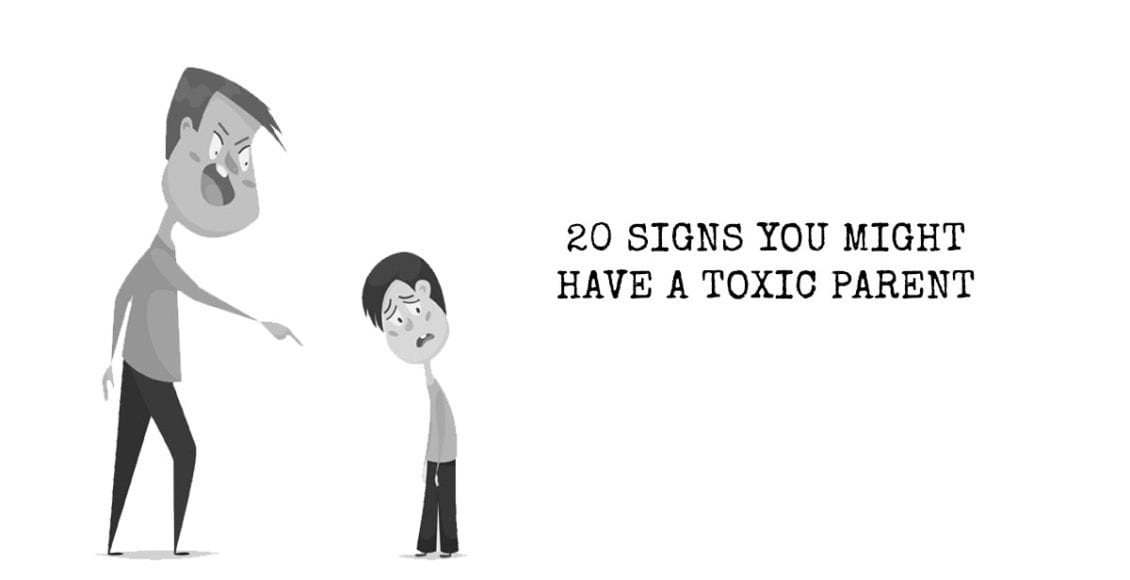“Children who are not encouraged to do, to try, to explore, to master, and to risk failure, often feel helpless and inadequate. Over-controlled by anxious, fearful parents, these children often become anxious and fearful themselves. This makes it difficult for them to mature, toxic childhood may even influence your life as an adult. Many never outgrow the need for ongoing parental guidance and control. As a result, their parents continue to invade, manipulate, and frequently dominate their lives,” wrote Susan Forward.
Do you have a parent who has been – and may even continue to be – a toxic force in your life? Here are twenty ways to tell:
1. Your parent refuses to respect your boundaries, even when you are clear and assertive about them. Has your dad ever smashed your piggy bank to help himself to another round of beer with his buddies? Has your mom rushed into your room “to get something” without knocking at the door first? You know what I mean….
2. You are often being held to higher standards of behavior and accomplishment than your parents themselves have been able to achieve.
3. Your parent makes jokes about things you are insecure with – like your weight, your income, or your relationship status. For sure, this is not a behavior one would normally expect from his parents.
4. In your childhood home, your parents’ feelings were given much more weight and importance than your own. The toxicity of the situation lies in its absurdity – when you become a parent, you are supposed to prioritize your child’s emotional well-being over your own.
5. When you have upset them, your parent uses passive-aggressive behavior in response. They may give you the silent treatment or buy a large gift for a sibling.
6. Your parent criticizes you more often than they provide support, compliments, or encouragement. And we all know how critically important is the encouragement a child receives from their parents for his or her emotional stability as an adolescent and teenager.
7. You struggle to show negative emotions. You rarely cry, and when you do you may feel unnecessary shame about doing so. This has to do with the fact that toxic parents tend to give vent to their own negative emotions while suppressing that of their children.
8. You feel as though your parent would behave differently if you were somehow better – smarter, more successful, or better behaved, for example. Stop blaming yourself, for a toxic parent can never be pleased!
9. Your parent intentionally makes you feel guilty when they do not get their way in your relationship.
10. When you accomplish something you are proud of, you hesitate to share the news with your parents. You’re afraid that their criticism will ruin your excitement.
11. Your parent demands praise and attention from you. This is yet another example of reversed social roles. In some extreme cases, one may even start asking themselves who’s the child in the family, really.
12. You were often forced to participate in activities that interested your parents, as opposed to those that you, yourself, were passionate about. As a result, you might have learned the rules of many card games your parents used to play at an early age.
13. Your parents taught you to respect them through the use of fear and intimidation.
14. You struggle with authority figures as an adult. You may be very submissive, passive-aggressive, or inappropriately rebellious.
15. Your parents use money and guilt to manipulate you. They often remind them of how much you “owe” them for the things you were given – even those that you did not ask for. After all, you never asked them to create you in the first place, did you!?
16. Your parent often complains about the things they have given up for you. You wonder if they would have been happier had you never been born. This is the peak of toxicity a parent can show towards their own flesh and blood! The absurdity of the argument leaves me speechless and fuming!
17. Your parent often blames you for their own inappropriate reactions or bad behavior.
18. You are terrified lest other people might notice your mistakes. You often take steps to hide them when you should have been owning up to them.
19. Your parent provided “tough love” more often than positive affirmation and security. Children who have been often subjected to physical punishment are likely to become insecure and violent in later life.
20. You rarely try new things or take risks because you are afraid of how it will look to others if you fail. In some eastern cultures like the Japanese, for example, the fear of failure has been taken to extremes.
“Unfortunately, because emotional abuse is often tolerated or because the abusive parents are very secretive in their abuse (hiding their true selves when in public), emotionally abused children will assume that how they were treated at home was natural. They have no frame of reference. And so, the child will develop a skewed sense of what a healthy relationship is,” explained Veronica Jarski.
If you have been the victim of a toxic parent, it is possible for you to regain control of your life.
Many children of toxic parents grow up to be healthy, happy, and emotionally independent adults themselves.
However, this does not happen without a significant amount of work on their part. Therapy, self-care, and the cultivation of a positive support network can get you started. I wish you the best of luck on the long road ahead – I can promise you the struggle is worth it.



